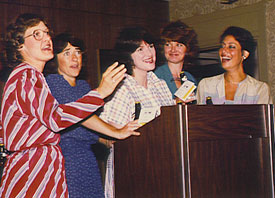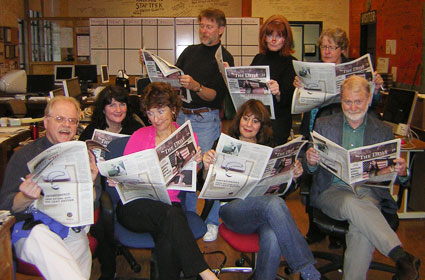|
Note: The Olympia Legislative Reporting Internship Program students cover the Washington Legislature for a daily newspaper or radio network. They work full time in Olympia during winter quarter. Past employers include The Seattle Times, the Post-Intelligencer, the Oregonian, the Everett Herald, the Kitsap Sun, the Lewiston Tribune, the UW Daily and Northwest News Network, which includes the public radio stations KUOW and KPLU. Students work directly with an editor or news director and are supported by the program coordinator.
Our Collective Story
Last November, alumni of the inaugural class of the Communication Legislative Reporting Internship Program gathered on the UW Seattle campus and each others' homes to reconnect and reminisce. Here are some of their memories:
 |
| Interns from the class of 1973 reunited in 1985. From left: Marilyn Hagberg, Betsy Trainor, Alicia Comstock, Nancy Bergh and Elaine Kraft. |
Nancy Bergh Pollock, '74
If I could draw a picture of memory, it would resemble the inside of a pomegranate, filled with a million tiny time capsules. I suspect that January of 1973 was a very newsworthy period of time, but, try as I might, I cannot remember a single headline or issue. That wouldn't seem so strange except that, at the time, I was an aspiring journalist, on my way to work for a real newspaper in a real state capitol. What I was soon to find out ..
Marilyn Hagberg, '84
We 13 journalism students had been handpicked by our professors to cover the legislature full-time. Each of us had been assigned a real-world newspaper. With the AP Stylebook in hand, fresh from a class on political science and standing on the First Amendment, we took the capitol by storm. The future of the program rested on our shoulders. We worked hard and played hard, accumulating new identities as we went.
W. Scott Handley, '73
Olympia was familiar as the state capitol, but it was very new and exciting to be working there for a real newspaper, meeting daily deadlines, carrying out assignments and producing stories and photos, all the while learning, learning, learning. Some members of the professional press corps were less than welcoming, but they also provided opportunities for fun. Remember Adele Ferguson?
Elaine J. Kraft, '73
The things I learned had nothing to do with politics or journalism. Our learning included working with key members of the venerable House and Senate and press corps. We actually did file a story or two as I recall, but mostly we saw how the real politics worked—deals and discussions just about everywhere but the official chambers. I stayed in the Washington/King County political and media realm, and still see several of those honorable electeds on a fairly regular basis. We often talk about our group's time in Olympia and share fond memories of that UW experiment.
David Horsfall, '73
I’ve shot commercials with Jamie Lee Curtis in Hollywood, I’ve been to advertising award shows in Manhattan, but a richer and more formative experience was going to Olympia with E. Joy, Alicia, the undertaker’s daughter from Oroville and the rest of the Olympia 13. Up until then I had been slogging my way through the UW, feeling unconnected and uninspired. It wouldn’t be an exaggeration to say that being a legislative reporting intern changed my life. It caused me to study advertising and journalism, which led to a 30-year career in advertising, eventually becoming a vice-president at the largest agency in Seattle. Looking back I have fond memories of the fun we had in Olympia, but maybe the fondest memory will always be reserved for a rumpled old professor who took us under his wing and gave us a chance to fly.
 |
| Several members of the class of '73 interns today. |
Dorian Smith, '73
In my junior year at the UW, I briefly considered dropping out. I wasn't doing well in my Communication classes, mostly the ones in Communications theory. At the same time, I worked days and weekends at the Seattle Times. It appeared that what I saw at the Times was completely different from what I was studying. But a Times’ city editor set me straight, when he said, "Get the degree, kid. It's your license to work." So I muddled through without experiencing the joy I was seeking—until those three months in Olympia. We worked fast and furious, my first taste of life as an adrenaline junkie that I was later to become. We understood the "serious" side of our assignments, but amongst ourselves we could distort them to a shocking hilarity to keep the balance.
John B. Harrison
Your writings bring me back to the bullpen office where we all worked, images of Sen. Perry Woodall, Adele (of course), writing copy on a manual typewriter and faxing to the Tri-City Herald. Then there was Mike Layton, ace Seattle PI reporter who trashed us at first, but relented thanks to our good work and BJ's lobbying. Alex Edelstein's smiles as he visited us. So where did all the Olympia experience take me? I'm now a finance person, but am the one who always gets asked to make the power point slides, do the presentation, explain finance to our clinicians and make the numbers relevant to the audience. So I guess I have always been a storyteller and what I learned from the program and from you guys is still helping me today.
Dave Rea, '78
We were young and hopeful and attuned to the Legislature, wading into its thick mass of political processes, laboring to write coherent stories for daily newspapers serving cities in which, for the most part, we had barely set foot. We weren't sure how much we could count on Dr. Edelstein's humanistic theory of reporting. But we had B.J., our wise, soft-spoken father figure of newswriting, whose powers of editing and advice could rescue even the most misbegotten story from a grinding, wallowing death. And we had each other, a cozy circle of personalities, gossip and bent humor. Our warmly irreverent spirit had to be one reason we made it through. In deep storage I found some of my clips from that quarter and I see now that I always tried a little too. I see now that what really carried my stories were the incidental snatches of accurate, economical wording and—even more—the pithiest quotes. Now we are older. The clatter of typewriters has departed from this earth, and I'm a happy, carefree old guy puttering away on a copy desk. I still find that grammar is a nuisance, but a nuisance in a good way. And I've come to appreciate great writing not for showiness but for its detoxifying effects.
|


